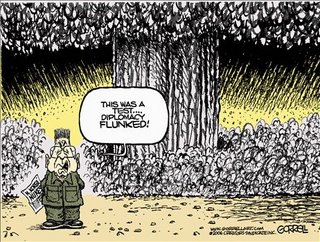Dealing with North Korea

By Jack Kelly Real Clear Politics.com
In the fantasy world many liberals inhabit, every person on the planet except George W. Bush is a decent, rational human being with whom satisfactory settlements can be negotiated, if negotiations are conducted in good faith (that is, the U.S. acknowledges that tensions which exist are mostly, if not entirely, the fault of the United States).
North Korea's nuclear test this weekend has shaken this comfortable presupposition.
North Korean dictator Kim Jong Il is hard to love even by those who have warm, fuzzy feelings for Fidel Castro and Venezuela's Hugo Chavez. There just isn't much nice to say about a regime that routinely starves its people in order to build more weapons, even for people who love to say nice things about those who hate the United States.
The reported North Korean test has brought international condemnation, and has prompted an emergency meeting of the UN Security Council. The reported test also likely will spark renewed interest in ballistic missile defense, especially in light of views like this, expressed by North Korean spokesman Kim Myong Chol in the Asia Times last Friday: "A next war will better be called the American war because the main theater will be the continental U.S., with major cities transformed into towering infernos."
So why don't I share in the general alarm?
First, North Korea has been suspected of having the bomb since at least 1998, and declared that it did in 2002. The test merely confirms what was already widely supposed.
Second, the bang wasn't very big. South Korean and U.S. estimates place it at roughly half a kiloton. This means the test probably was a dud, said Jeffrey Lewis, director of the Managing the Atom project at Harvard's Kennedy School of Government.
"A plutonium device should produce a yield in the range of 20 kilotons, like the one we dropped on Nagasaki," Mr. Lewis wrote on the Defensetech Web site Monday. "No one has ever dudded their first test of a simple fission device. North Korean nuclear scientists are now officially the worst ever."
Third, the test has alarmed the South Koreans, who are rethinking their appeasement policy toward the North, and angered the Chinese, without whose continued support the North Korean regime cannot survive.
When they were developing their bombs in the 1990s, neither India nor Pakistan announced their nuclear tests in advance. Kim did, because he uses brinksmanship as a negotiating ploy, one which in this instance seems to have backfired.
"If Kim Jong Il deliberately timed the test to coincide with Japanese Prime Minister Shinzo Abe's visit first to Beijing and then to Seoul, he may have dreadfully miscalculated," wrote Donald Kirk in the Asia Times Monday.
Kim's Stalinist policies have so screwed up North Korea's economy that only massive shipments of food and fuel -- most of it provided by and nearly all of it funneled through -- China, keep the country barely afloat. If China were ever to cut off the largesse, the regime would collapse.
China has resisted using threat of an aid cutoff as a negotiating tool in part because it fears the consequences of a North Korean collapse (tens of thousands of starving refugees flooding into Manchuria), and in part because China enjoys the migraines North Korea gives South Korea, Japan and the U.S. But North Korea's provocations are changing the calculus.
A North Korean nuke means Japan, and possibly South Korea, will obtain nuclear weapons of their own, a development China would very much like to prevent.
The six party talks (about getting North Korea to abandon its nuclear program) have been going nowhere because China and South Korea have been unwilling to shake meaningful sticks at Kim's regime. But that calculus is changing.
Josh Manchester, a former Marine whose Web log (Adventures of Chester) is must reading for serious students of national security policy, thinks the test proves "American policy against North Korea is working.
"That policy, in a nutshell, is this: use all methods short of war to harm the economy of North Korea, making it impossible for that government to raise revenue from illicit activities, and thereby more and more difficult to retain power or fund its nuclear ambitions.
"This creates cascading effects that work in favor of the U.S: the possibility of a North Korean collapse forces China and South Korea to consider changing their stances in the six party talks, making it more likely the (five) will agree on a unified plan to de-nuke the peninsula, and that North Korea will have no choice but to accept."
Comments
Generally I have to agree with the author. However, I think the "go it alone" strategy that the Bush administration seems to favor had better be well thought out.
Obviously the geniuses that got us into Iraq, might consider talking to Albright, Baker, and maybe GHW Bush, before they make another great blunder.
Japan, South Korea and China (both) probably have a greater stake in this than we do.